Key Takeaways
- Relatively few college students use professional social media to set up professional profiles, and most prefer not to use popular social networks to share and find information about jobs and internships.
- MyEdu provides a free platform for students to build a professional profile and find employment opportunities that match their skills, interests, and abilities.
- MyEdu for Employers provides college recruiters with access to student profiles in an easily searchable format and enables private contacts between employers and interested, qualified students.
Employers who recruit heavily on college campuses typically engage with the career services office to set up campus visits, attend career events, or plan in-person interviews. These employers select the campus location based on precedence ("We've always gone here") or personal relationship ("This where our CEO went to school"), and their ability to target multiple campus geographies is highly resource constrained. This context is, to quote Clay Christensen, an indicator of "new-market disruption": people need to travel to an inconvenient and centralized location in order to engage with a highly specific population.1 Students seem reticent to use more casual networks, like Facebook, for sharing and finding jobs and internships. Social networks like LinkedIn provide a recruiting platform for hiring seasoned professionals, but are underutilized by college students.2
MyEdu provides a free platform to students, helping them find and secure a job or internship. It includes schedule planning tools, professor ratings and reviews (drawn both from students and official data supplied by the college or university), and a highly visual professional profile (see figure 1). This profile is built passively as students use the various academic tools. It can also be personalized with languages, work experiences, projects, and — most importantly — skills, so students can present themselves to employers in a professional manner. For most college students, this is their first professional profile: only 36.7 percent of MyEdu student users report using LinkedIn.
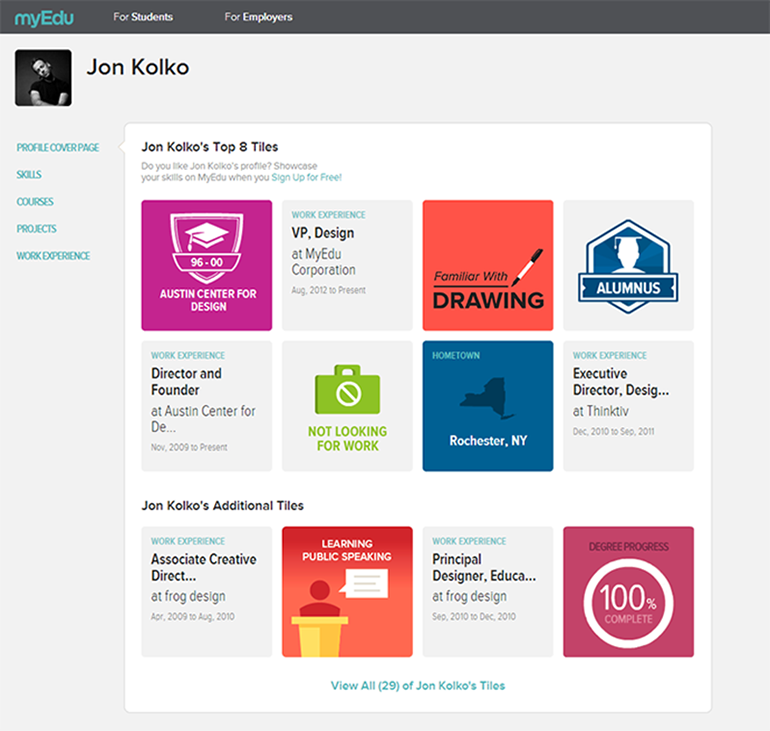
Figure 1. A sample MyEdu profile page
The MyEdu for Employers service (figure 2) provides college recruiters with access to student profiles in an easily searchable format. Using Talent Search, employers can search at a detailed level of granularity ("Show me only Computer Science students at University of Texas who are graduating in May and have had at least one internship") to drill down to a small group of highly qualified candidates. Additionally, employers receive a Talent Scout weekly newsletter of candidates who match their routine hiring needs. This provides recruiters both an ambient and direct way of uncovering the candidate who fits the company's hiring and cultural criteria.
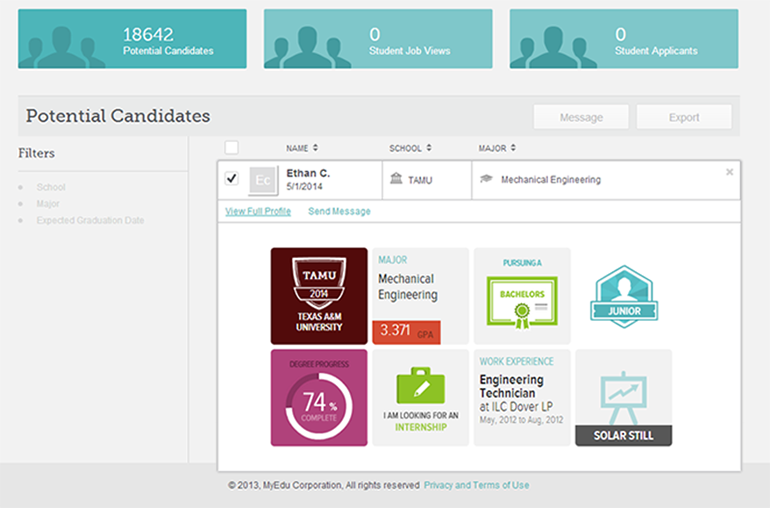
Figure 2. MyEdu for Employers screen of a potential candidate
How MyEdu Works
Many students find out about MyEdu from their career service office or from academic advisors. When a student registers for a free MyEdu account, he or she is prompted to create a profile. In its simplest form, this profile includes information about academic experiences (major, expected graduation date, and school) and career aspirations (desired job and location). As this information is entered, a rich visual profile is created.
Demo of the MyEdu Profile (1:46 minute).
Customizing a Skill-Based Profile
Students can add specific skills to their profile, such as knowledge of PHP or MySQL, to illustrate their competencies for employers. They can associate these specific skills with their work experiences or projects to legitimize their claims in the eyes of skeptical employers (see figure 3). Students can also add soft skills, like leadership and confidence, to tell a personal story about their abilities. Adding a skill and associating it with a work experience or project "levels up" that skill, further illustrating competency and expertise in a given area.
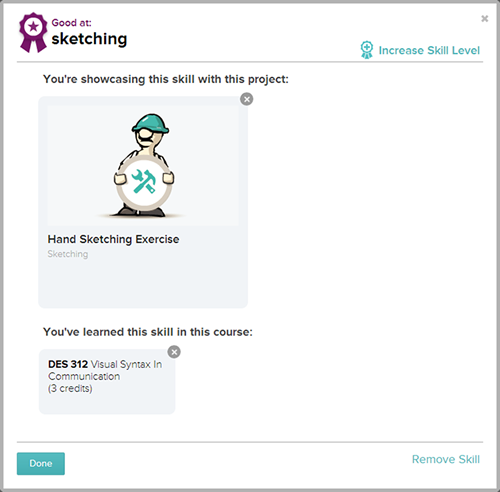
Figure 3. Showcasing skills in MyEdu
Managing Courses and Grades
MyEdu also offers free academic planning tools. These include a schedule planner (see figure 4), grade calculator, ratings and reviews of professors — to help students select classes that match their learning style — and a personal education plan. Students at large universities can fall behind in their coursework, and the oft-cited figure that "four-year colleges graduate 53 percent in six years" is in part due to students taking the wrong classes, taking classes out of order, or failing to take prerequisite classes.3 For students at large universities, MyEdu's academic planning tools help them take the right classes at the right time, assisting them in understanding their course sequencing and guiding them to stay on track to graduate on time.

Figure 4. The Schedule Planner
MyEdu presents students with up-to-date information about course schedules, sections, and professors for over 800 schools. As students select courses and plan their schedules, these courses are also added to their profiles. Again, students can substantiate their profile skills by associating them with these courses — "I learned PHP in this course" — to offer evidence that they have achieved competency.
Finding an Internship or Job
MyEdu's goal is to find employment opportunities for students that match their skills, interests, and abilities and help them secure employment. When employers post jobs or internships (see figure 5), they can target those jobs to students at specific schools, who are pursuing specific majors, and who have attained specific skills. Students will see highly relevant jobs that match their abilities and can learn more about the specific job, company, or even the region where the job is offered. Then they can express interest online. Employers will receive notifications that students have viewed their job postings or expressed interest and can contact students directly using the MyEdu messaging service. This provides a secure and private way for students and employers to connect, discuss a job, and determine if there is a good fit.
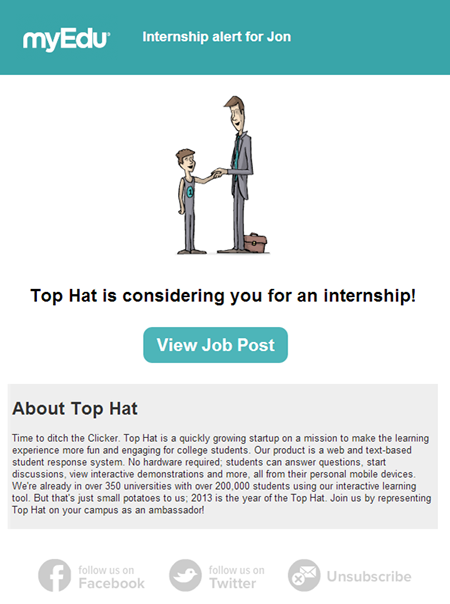
Figure 5. An internship alert
Development Status
Current customers — including Macy's, Waste Management, and VMware — use MyEdu for Employers to identify college talent. Additionally, a free trial is available, which allows small and medium-size business owners to try the service before committing to a long-term investment. Over 450,000 students have created rich profiles and elected to show their profiles to employers.
Recent Company Pivot
MyEdu's goal to help students secure jobs and internships is the result of a strategic pivot of the company that began in fall 2012. While early efforts focused on monetizing various forms of academic planning, MyEdu's leadership saw a much larger financial and social benefit to helping students find jobs and internships during the late years of their college careers. The MyEdu Student Profile and the MyEdu for Employers products representing this strategic shift have been in market since October 2012. The challenges faced and overcome in this shift have been largely cultural, as MyEdu's product roots are embedded in academia. The product team needed to quickly understand the wants and needs of students during their job search, as well as the unique needs of college recruiters. This knowledge was acquired through qualitative ethnographic research and a pre-beta pilot test of limited functionality. The resulting product, consisting of Talent Search and Talent Scout, encapsulates the team's findings related to workflow, functional prioritization, and emotional resonance.
Impact
MyEdu aims to help students get jobs. Impact is measured based on the number of students that have created profiles, the number of students that view and apply for jobs, and how many students are placed in jobs. Figure 6 shows the number of students adopting MyEdu Student Profile, and table 1 shows the number of MyEdu student profiles for specific majors.
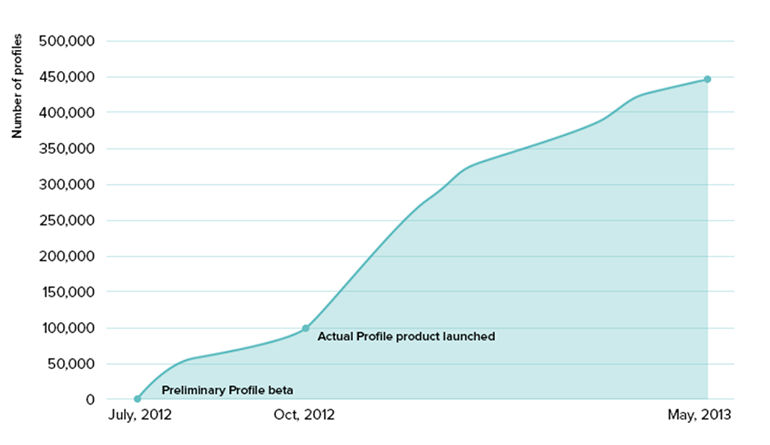
Figure 6. Number of students creating MyEdu profiles
Table 1. MyEdu student profiles by major
|
Major Family |
Number of Profiles |
|---|---|
|
Busines |
74,823 |
|
Engineering |
54,187 |
|
Biology & Life Science |
44,635 |
|
Health |
41,767 |
|
Computers & Mathematics |
27,984 |
|
Psychology & Social Work |
24,750 |
|
Social Science |
23,469 |
|
Education |
20,131 |
|
Humanities & Liberal Arts |
20,032 |
|
Communications & Journalism |
17,411 |
|
Arts |
16,478 |
|
Agriculture & Natural Resources |
13,271 |
|
Physical Sciences |
11,629 |
|
Law & Public Policy |
8,665 |
|
Industrial Arts & Services |
2,201 |
In Summary
The long-term theory of change related to MyEdu's products is to impact course and major selection earlier in the academic journey, helping students maximize their educational value and gain skills and competencies in a field that's highly employable.
The main benefits include:
- First, MyEdu's academic products offer students a simple, visual way for them to network professionally, sharing their skills, interests, and job goals and targeting their presentation to specific employers.
- Second, the MyEdu for Employers suite of products enables recruiters to identify and contact qualified candidates.
- Third, the breadth of student profiles means that employers can find many candidates with highly specific talents in a single place.
The student suite of MyEdu products is available here; MyEdu for Employers is available here.
- Clayton M. Christensen, The Innovator's Dilemma: When New Technologies Cause Great Firms to Fail (Boston: Harvard Business School Press, 1997).
- Brian S. Hall, "Why Aren't College Students Using LinkedIn to Find Jobs?," ReadWrite, April 23, 2013.
- Mary Beth Marklein, "4-year colleges graduate 53% of students in 6 years," USA Today, June 3, 2009.
© 2013 Jon Kolko. The text of this EDUCAUSE Review Online article is licensed under the Creative Commons Attribution 3.0 license.
